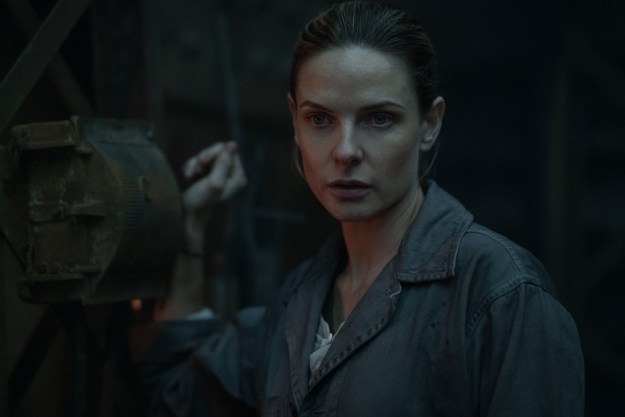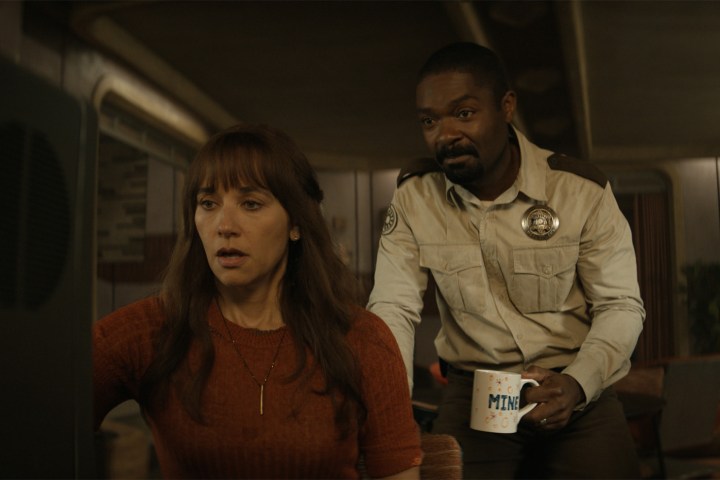
“Apple TV+’s Silo is an entertaining and often intriguing sci-fi thriller that might feel directionless were it not for Rebecca Ferguson’s capable, commanding lead performance.”
Pros
- Rebecca Ferguson’s capable central performance
- Several genuinely intriguing ongoing mysteries
- Stunning production design throughout
Cons
- Several uninteresting supporting characters
- Unnecessary filler in the show’s second half
Silo is a perfect example of what can happen when a team of capable craftsmen decides to hop into an already overcrowded genre. The new Apple TV+ original show is one of many dystopian TV series that have premiered in recent years and its visual and tonal cohesion makes it a fitting addition to a content library that already includes other high-budget sci-fi dramas like Extrapolations, For All Mankind, Severance, and Foundation. Thanks to the fictional post-apocalyptic society at the center of it, the show’s premise isn’t even all that dissimilar from so many of the other dystopian movies and TV shows that Hollywood has produced over the past 20 years (or even this year with The Last of Us on HBO and Sweet Tooth on Netflix).
Ultimately, what Silo has going for it is the talent it boasts both in front of and behind the camera. Not only does the series hail from Justified creator Graham Yost, but its directors also include Morten Tyldum (Counterpart) and Bert & Bertie (The Great), all of whom have proven themselves as capable TV technicians. Add in an on-screen ensemble of recognizable movie stars and reliable character actors and what you’ve got is exactly what Silo is: A well-made sci-fi thriller from top-to-bottom that won’t necessarily set your world on fire, but will always manage to keep you entertained and engaged.

Based on a series of sci-fi novels by Hugh Howey, Silo takes place — as its title suggests — in an underground structure that goes hundreds of floors deep beneath the surface of the Earth. Its inhabitants have been told that the world outside of the silo was rendered inhospitable long before they were born for reasons that they’re not entirely sure of. The only connection they have to the world above them, therefore, comes via a camera that supposedly shows them a live feed of the Earth’s surface.
The camera is cleaned on an inconsistent basis whenever one of the silo’s inhabitants requests to “go outside,” a wish that’s not only considered a crime but is granted without fail. When the series begins, the silo’s appointed lawman, Sheriff Holston (David Oyelowo), requests to go outside much to the shock of all of the structure’s citizens, including his right-hand man, Deputy Marnes (a delightfully prickly Will Patton). A majority of Silo’s 10-episode first season is subsequently spent exploring a past tragedy involving Holston’s wife, Allison (a superb Rashida Jones), as well as the fallout that comes when he surprisingly names Juliette Nichols (Dune: Part Two‘s Rebecca Ferguson), a standoffish mechanic, as his choice to replace him as sheriff.
While Silo’s spectacular, heartbreaking first episode mostly bounces between Holston and Allison’s perspectives, the series’ first season is largely told from the point-of-view of Ferguson’s Juliette. Normally, sidelining accomplished actors like Rashida Jones and David Oyelowo would be a crime punishable by immediate cancellation, but Silo is in the fortunate position of having Rebecca Ferguson as their replacement. The actress, whose work in Dune and the Mission: Impossible films has made her a recognizable face, is more than capable of not only filling Oyelowo and Jones’ shoes but also shouldering much of the dramatic and emotional weight of Silo’s story.

From the moment she’s introduced on-screen for the first time, Juliette strikes a memorable figure. Over the course of the episodes that follow, Ferguson continues to turn in work that is alternatively sure-footed and vulnerable, but always commanding. Silo’s creative team wisely pairs her with an array of similarly accomplished performers, including Patton, Tim Robbins, and Harriet Walter. Playing characters with drastically different relationships to Juliette, the latter two actors, in particular, are capable of matching Ferguson’s star power without feeling the need to meet her specific energy.
That said, not all of Silo’s cast members turn in performances that are as compelling as others. Saddled with a character who never feels anything more than thinly sketched, Common’s turn as an underhanded enforcer named Sims particularly fails to feel as human and multi-dimensional as his co-stars’ performances. Elsewhere, as Paul Billings, Juliette’s government-appointed deputy, Chinaza Uche initially emerges as a compelling on-screen counter to Ferguson, but Silo ultimately fails to explore his character deeply enough to justify his inclusion in its later episodes.
Behind the camera, Silo’s directors all turn in strong, if not necessarily stunning, work. The series doesn’t look particularly better than many of the other sci-fi shows that have premiered in recent years, but Gavin Bocquet’s production design does a lot to make Silo’s eponymous facility feel lived-in and real. Making a massive, multi-level nuclear shelter look and feel as big as it’s supposed to be isn’t an easy thing to do with a TV budget, but Silo mostly manages to pull that trick off with flying colors, which is a testament to the level of talent present in its creative team.

Although Silo relies on a handful of mysteries to propel its plot forward as well, the series rarely feels like it’s stretching them out for too long. The paranoia-driven questions surrounding the history of the show’s titular silo, in particular, not only further fuel the curiosity of its heroes but also provide them with more than enough dramatic encounters with the series’ shadier characters. Unlike most mystery box-esque sci-fi dramas, Silo feels like it has plenty of material to fill out its initial 10 episodes, and its game-changing season finale effectively sets the stage for a second batch that could be wildly different and more expansive than its first.
The show’s strengths link it in many ways to Yost’s previous TV efforts — namely, Justified, which made Timothy Olyphant into an enduring TV star. Silo never feels quite as tonally specific as that FX series, nor does it ever manage to match Justified’s infectious, Western-infused attitude. It does, however, establish a setting that feels detailed and authentic, and it introduces a cast of distinct characters who just so happen to revolve around one immensely charismatic central star.
Much like Justified, Silo is an extremely watchable series, the kind that always makes pressing play on its next episode a surprisingly easy decision. That’s an achievement that shouldn’t be discounted these days.
The first two episodes of Silo are now streaming on Apple TV+. Digital Trends was given early access to all 10 episodes of the series’ first season. For other shows to watch, please read 5 TV shows you need to watch in May 2023.
Editors’ Recommendations
Credit: Source link


Comments are closed.